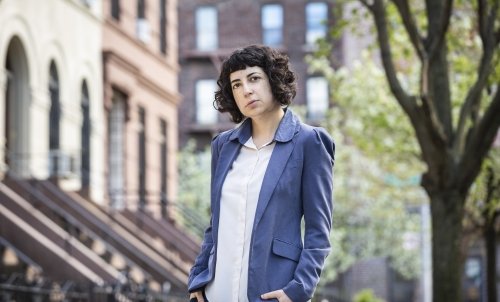Meet the FAS faculty: Neta Alexander
Neta Alexander, Assistant Professor of Film and Media Studies, studies the relationship between technology, society, and our bodies.

Neta Alexander. Photo credit: Natan Dvir.
To nominate an FAS faculty member to be featured in this series, please email fas.dean@yale.edu.
When’s the last time you used closed captions or increased the playback speed while watching your favorite TV show? According to Neta Alexander design features like these, which mediate our relationship with the stories on our screens, can be traced back to the work of disability activists.
Alexander is Assistant Professor of Film and Media Studies in Yale’s Faculty of Arts and Sciences (FAS). Her research weaves together threads from film theory, media studies, science and technology studies, and the last two centuries of technological growth that have reshaped our society.
Prior to joining the Yale faculty last July, she was Assistant Professor of Film and Media Studies for five years at Colgate University and served as an Assistant Editor for the Journal of Cinema and Media Studies (JCMS).
Today, Alexander’s work is animated by a crucial question: “How do we create a world in which technology can actually serve us, instead of us serving technology?”
Stories, media, and technology
Alexander began exploring and combining a wide variety of academic fields during her undergraduate days, when she became interested in philosophy, comparative literature, and English and French translation studies.
“I always loved films, and I was always eager to find a way to incorporate films into my research and into my studies, even in college,” she said. Her interest in technology and its power to shape our relationship with storytelling emerged at this time, too. “The technologies that we use change the stories that we are able to tell,” Alexander pointed out, “and they change our relationship with our own bodies and each other.”
From there, her interest in the nexus of stories and technologies only expanded. After obtaining her BA in Comparative Literature, she went on to complete her MA in Film Studies at Columbia University and PhD in Cinema Studies at New York University.
As her career has progressed, Alexander's research topics have ranged widely: from the history of public speaking and teleprompters, to how buffering, lag, and moments of digital disconnection are being ignored and downplayed by both users and scholars. Our black box devices and interfaces have become crucial for our lives, according to Alexander, yet they produce a prevailing sense of “perpetual anxiety” stemming from the fear of technological or infrastructural malfunction.

At the center of many of her research questions is the relationship between technology and society, and how the former transforms the norms of the latter. In her first book, Failure (Polity, 2020), Alexander and her co-author Arjun Appadurai examine the implications of tech becoming interwoven into almost all aspects of contemporary life.
Their writing reveals how Silicon Valley and Wall Street monetize failure and forgetfulness in their consumers and financial markets. As they dive into the limitations of technology and the downside of letting companies ‘move fast and break things’ in the name of innovation, Alexander and Appadurai question why the public tends to forgive and forget the shortcomings of technology, the companies that promise endless progress, and governments that fail to regulate digital markets.
“We still really hold on to the idea that the internet and digital technology is democratizing, empowering, it's about consumer choice and so on – while, in fact, it also really limits our choices and our way of life,” she said.
Our devices, our bodies
Alexander’s work also explores our personal, one-on-one interactions with technology and its impact on our bodies. Her second book, Interface Frictions: How Digital Debility Reshapes our Bodies (Duke University Press, forthcoming August 2025), explores four ubiquitous interface design features: refresh, playback speed, autoplay, and Night Shift. In the book she coins the concept “digital debility”: the “slow and invisible ways in which technology breaks the human body.”
"What I wanted to do with Interface Friction is to really ask the question, ‘How can we write media theory from the point of view of the so-called non-average user?” said Alexander. “If we put a non-average user, specifically a person with disabilities, at the center of our media history and theory, how would that change our understanding of the discipline?’”
Alexander's inspiration for Interface Frictions also stemmed in part from her personal relationship with technology. Confined to her house and teaching remotely during the COVID-19 lockdowns, Alexander began to notice physical symptoms: migraines, eye strain, and pain in her back and neck.
How could technology be creating new forms of disability, she wondered, when it already wasn’t great at providing for existing users with disabilities? How do ubiquitous design features like the refresh or the autoplay push users to ignore their bodily and cognitive needs? And what can the long history of disability justice and activism teach us about hacking, tweaking, and re-modelling technologies to better fit our bodies?

Disability accommodations – digital and otherwise – have typically been an afterthought in product design. It wasn’t until 1990 that U.S. legislation like the Americans with Disabilities Act (ADA) even mandated and regulated accommodations across corporations, including digital entities.
Closed captions only became a precedent for major streaming services in 2010 when the National Association of the Deaf won a lawsuit against Netflix for its lack of closed captioning on their programs, justifying their demands under the ADA.
Another digital example, playback speed – the ability to speed up or slow down audio or video content – can be traced back to activism from blind students in the 20th century. After becoming frustrated listening to slow audiobooks, they put pressure on audiobook manufacturers and companies to give them record players with more flexible capabilities to adjust the playback speed.
“So this idea that the end user, rather than the content producer, is the one who should control the playback speed came from disability activism,” explained Alexander. “And the fact that we all use it now, because it's available on YouTube and on Netflix and pretty much on every video platform I can think of, is thanks to the many years of activism of those blind people, which was richly studied by media disability scholars Mara Mills and Jonathan Sterne."
With the rise of disability media studies, Alexander has taken joy in highlighting these and other contributions of disability activists and their long-lasting impact on the features of technology we use every day. Digital inclusivity and media history are significant running themes in Alexander’s lectures: in the fall 2024 semester, she taught two undergraduate classes, FILM 372: What is Television? and FILM 390: Media, AI, and Algorithmic Bias. She highlighted the reciprocal relationship of teaching and learning, mentioning students’ profound impact on her work.
“It’s been amazing [teaching] because my students are just blowing my mind,” she said. “Working with Yale students is such a privilege. They have really engaging conversations, and I feel that I'm able to push them and they push me back.” In addition to enjoying the natural curiosity of her students, Alexander also highlighted the inclusivity of her courses, being accessible to enrollment from students of all majors and educational backgrounds.
Alexander often takes a hands-on approach when teaching. She’s assigned students to undertake a 10-hour digital detox while journaling, reading Jenny Odell’s How to Do Nothing, and reflecting on their relationship with their personal electronics. She’s also assigned them podcasts and recent interviews with members of “the Luddites Club,” who debunk common misconceptions about the centuries-old history of selective technological use and adoption.
This semester, Alexander is collaborating with Francesco Casetti, Sterling Professor of Humanities and Film and Media Studies, to co-instruct FILM 438/766: Media Anxieties at the undergraduate and graduate level. The class explores technophobia through a historical lens. The two professors hosted a speaking series as part of the course, inviting four international scholars who work on media anxiety and digital protection to campus.
“I'm a big believer in the power of humanities to not only help us tell stories, but to also help us find meaning in our lives,” she said. “I want people to feel a real reinvestment in their relationships, with their communities, with the people they love, and also with their own bodies, knowing that their bodies are constantly in flux and they are precarious and fragile. This fragility, however, is also what makes human bodies beautiful, creative, resilient and – despite what Big Tech might tell us – forever unpredictable and unknowable.”